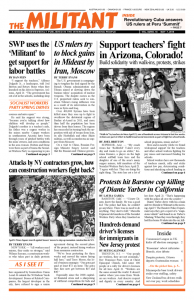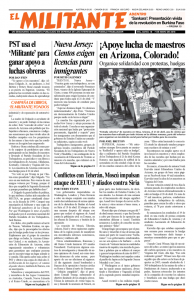Below is an excerpt from Lenin’s Struggle for a Revolutionary International, one of Pathfinder’s Books of the Month for April. In September 1916 the last national conference of the united Socialist Democratic Party of Germany took place before it split. The right-wing leadership assured itself a majority, but the revolutionary socialists, organized in the Internationale Group — popularly called Spartacists — were able to present their program in a speech titled, “Use Workers’ Strength to End the War.” It is excerpted below. Copyright © 1984 by Pathfinder Press. Reprinted by permission.
BY KÄTE DUNCKER
Comrades! The Internationale Group asked me to speak here, not only because we sharply oppose the majority’s policy, but also because we are critical of the Social Democratic Working Group on certain essential points, above all on the International and defense of the fatherland. To the extent that they go beyond simple rejection of the war credits, the Working Group and its followers seek to return the party and the International to their pre–August 4 positions, thus resuming the supposedly well-tested and triumphant policies of that period. In fact, August 4 clearly revealed that these policies failed precisely when put to the test. (“Very true!”) They did not lead to victory but rather to devastating defeat.
We consider that the Second International collapsed irretrievably on August 4, 1914. Despite all the fine speeches and resolutions at international congresses it could only collapse, because it was not an organic whole, but only a loose structure without internal cohesion. The national parties were autonomous and the German party in particular would never allow its freedom of action to be restricted by binding international decisions. Every attempt to make the International a real power ran aground when the German delegation replied, “Unacceptable.”
We are striving for an International that stands above the national parties. It must be the central goal and pivot of the proletarian class organization. It must decide on all questions whose significance extends beyond national frontiers, for example, the question of militarism and expansion of the navy, colonial policy, and above all what course of action to adopt in case of war. We want to build the International after the war on a sounder basis and make it into a real political force. The concept of internationalism, together with the idea of class struggle, must therefore become the very essence of our informational and educational work in the nation. Every party member in every village must sense and realize that the proletarians beyond our borders are our brothers and class comrades. We are closer and more committed to them than to the ruling classes of our own country. We counterpose internationalist ideology to the nationalist ideology to which the party capitulated on August 4.
Organizationally we do not conceive of the new International as a loose structure of autonomous parties with some office in Brussels or The Hague where comrades gather for non-binding discussions of international questions. However, contrary to the criticisms made by a Working Group publication, we do not envision the International as a commanding general staff reigning above the clouds and sending down orders from on high to the troops of the international proletariat. Rather we seek a permanent and much tighter organizational structure, one equipped with decision-making power. Resting on the internationalist consciousness of the masses in all capitalist countries, its decisions will therefore be binding for the Social Democracy in all these countries. (“How will you bring this about?”) You might say that we demand the transformation of the present loose confederation of provinces into a federal state.
Our stand on national defense flows from this position on the International and from our understanding of the imperialist nature of the war. As you know, every war begins with the battle cry, “The fatherland is in danger!” because it is such an excellent way to mislead the less informed masses. In previous wars this slogan was usually a conscious deception. It is all the more clearly a deception today, in the age of imperialism, when war is waged to determine relationships among the great imperialist states.
Between the big imperialist states there are no longer any defensive wars. The claim that one goes to war to preserve borders and national sovereignty is today an outright swindle of the people. (“How’s that again?”) When one pirate ship attacks another to take away its loot, we do not talk about justified self-defense. The imperialist powers always aim for expansion and plunder, and from the outset their wars are wars of conquest. (“Very true!”) It makes absolutely no difference on whose territory the war is fought. Of course, when there’s a war, it has to be fought somewhere. (Laughter) Just where, is a question of military fortune; it is not the basis for our judgment of the war. (“Very true!”)
As a human being and a Socialist I find it just as painful and shocking to see French, Belgian, and Russian proletarians killed as to see the massacre of German proletarians. “Sound the alarm, they’re killing our brothers!”— that must be the approach of internationalist Socialists, wherever war strikes. For that reason we cannot derive our position on this war and on approval of war credits from the military situation at any given moment. …
We call on all those who uphold the class struggle and international socialism to defend the integrity of our principles and display discipline in defending our world outlook. They must not be intimidated because of the protests of these fanatics over violations of party unity and discipline.
That means we must openly renounce obedience to the policy of the party establishment. We must break with the politics of half-measures and abandon the illusion that the crisis begins and ends with the purely parliamentary question of granting or rejecting the war credits. It means summoning the masses to a mighty struggle against imperialism and the war. Let us be clear on one thing: if the war ends as it began, as a gift from on high, as a result of diplomatic dealings, and without the intervention of the proletariat, then this peace will seal the defeat that socialism suffered in the war. If this peace is won through employing all the proletariat’s instruments of power, it is an entirely different matter. Such a peace will then prepare the victory of socialism and shape the International into a power that would forever prevent the reoccurrence of such a horrible genocidal slaughter.

